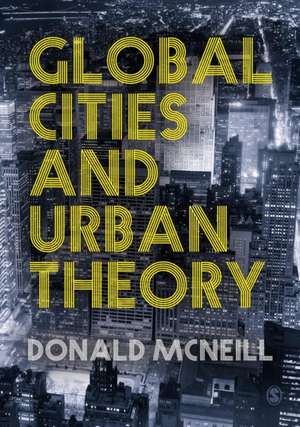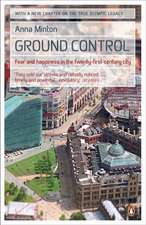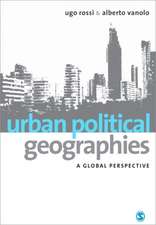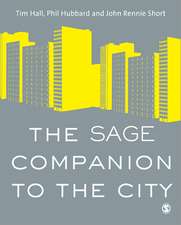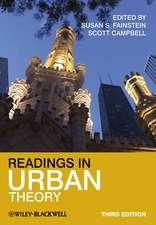Global Cities and Urban Theory
Autor Donald McNeillen Limba Engleză Paperback – 26 dec 2016
Donald McNeill draws on detailed discussions of major cities such as London, San Francisco, Paris and Singapore to provide a deep understanding of how urban theory can be grounded in the cultural economies of urban development. The book:
- Reviews the insights of key thinkers such as Bruno Latour, Mike Davis, and Jane M. Jacobs in relation to specific cities.
- Highlights methodological and epistemological notes on each theme.
- Provides case studies of nine key global cities, examined in the context of specific material and spatial practices.
| Toate formatele și edițiile | Preț | Express |
|---|---|---|
| Paperback (1) | 392.56 lei 22-36 zile | +22.20 lei 6-12 zile |
| SAGE Publications – 26 dec 2016 | 392.56 lei 22-36 zile | +22.20 lei 6-12 zile |
| Hardback (1) | 986.34 lei 43-57 zile | |
| SAGE Publications – 27 dec 2016 | 986.34 lei 43-57 zile |
Preț: 392.56 lei
Nou
Puncte Express: 589
Preț estimativ în valută:
75.11€ • 78.64$ • 62.15£
75.11€ • 78.64$ • 62.15£
Carte disponibilă
Livrare economică 17-31 martie
Livrare express 01-07 martie pentru 32.19 lei
Preluare comenzi: 021 569.72.76
Specificații
ISBN-13: 9781446267073
ISBN-10: 1446267075
Pagini: 200
Dimensiuni: 170 x 242 x 19 mm
Greutate: 0.39 kg
Ediția:First Edition
Editura: SAGE Publications
Colecția Sage Publications Ltd
Locul publicării:London, United Kingdom
ISBN-10: 1446267075
Pagini: 200
Dimensiuni: 170 x 242 x 19 mm
Greutate: 0.39 kg
Ediția:First Edition
Editura: SAGE Publications
Colecția Sage Publications Ltd
Locul publicării:London, United Kingdom
Recenzii
Donald McNeill’s book brings exceptional clarity to the core concerns of contemporary urban theory. Using a series of fascinating case studies and drawing extensively on politico-economic and actor network theories, the text demonstrates how cities are constitutive of, and constituted by, intersecting global process. In doing so, McNeill pushes forward the boundaries of critical urban studies by offering a systematic and crystal clear urban epistemology. With urban theory now at a turning point, this text should set the contours of debate as the emerging twenty-first century city is understood and theorized.
Donald McNeill has written a creative, innovative and authoritative analysis of the contemporary global city. It provides an impressive critical understanding of what we call the global and the city by focusing on the key material objects and social processes involved in constituting the relations between them. Global Cities provides an analysis of the key engineered sites of the cathedral of St. Peters, the airport and hotel, air conditioning and smart cities – amongst others - helping us to understand why some cities have been more influential than others in shaping global practices.
As Donald McNeill notes early in this book, scholarship on global cities “has been widespread and varied”. McNeill weaves paths through theory and cities via architects, airports, factories, hotels, cathedrals, taxis, ports and myriad other sites of money, movement, power and marginality. It is a journey worth taking – and McNeill proves a splendid guide.
This book asks fundamental questions for urban research. What is a city? In what sense is a city ‘global’? McNeill examines key forms of cultural, economic, and political power and practice through which cities are composed as material concentrations, from religion and logistics to air-conditioning systems and smart cities. The result, in a discussion that ranges from Rome and Paris to Dubai and Sydney, is a powerful and innovative account of why and how particular spaces, practices and forms in the city curate globality.
We may indeed have arrived at an ‘urban age’ but there is precious little critical insight about this important human development. Global Cities and Urban Theory is therefore a very important arrival and should be widely read and discussed. The book distills and advances Donald McNeill’s considerable ground breaking analyses of the global urban system, especially of the corporate and professional elites that seek to shape, indeed control, their destiny. McNeill deploys a highly original and timely critique to challenge the assumptions and assertions of urban power.
Donald McNeill’s Global Cities and Urban Theory is a clear and concise book that provides a welcome addition to the global cities literature. The book provides a clear image of what constitutes the global and the city in the 21st-century global economy. This precision and lucidity make the book accessible to a broad audience of scholars and nonacademics who are interested in better understanding the key processes of globalization and urbanization.
Donald McNeill has written a creative, innovative and authoritative analysis of the contemporary global city. It provides an impressive critical understanding of what we call the global and the city by focusing on the key material objects and social processes involved in constituting the relations between them. Global Cities provides an analysis of the key engineered sites of the cathedral of St. Peters, the airport and hotel, air conditioning and smart cities – amongst others - helping us to understand why some cities have been more influential than others in shaping global practices.
As Donald McNeill notes early in this book, scholarship on global cities “has been widespread and varied”. McNeill weaves paths through theory and cities via architects, airports, factories, hotels, cathedrals, taxis, ports and myriad other sites of money, movement, power and marginality. It is a journey worth taking – and McNeill proves a splendid guide.
This book asks fundamental questions for urban research. What is a city? In what sense is a city ‘global’? McNeill examines key forms of cultural, economic, and political power and practice through which cities are composed as material concentrations, from religion and logistics to air-conditioning systems and smart cities. The result, in a discussion that ranges from Rome and Paris to Dubai and Sydney, is a powerful and innovative account of why and how particular spaces, practices and forms in the city curate globality.
We may indeed have arrived at an ‘urban age’ but there is precious little critical insight about this important human development. Global Cities and Urban Theory is therefore a very important arrival and should be widely read and discussed. The book distills and advances Donald McNeill’s considerable ground breaking analyses of the global urban system, especially of the corporate and professional elites that seek to shape, indeed control, their destiny. McNeill deploys a highly original and timely critique to challenge the assumptions and assertions of urban power.
Donald McNeill’s Global Cities and Urban Theory is a clear and concise book that provides a welcome addition to the global cities literature. The book provides a clear image of what constitutes the global and the city in the 21st-century global economy. This precision and lucidity make the book accessible to a broad audience of scholars and nonacademics who are interested in better understanding the key processes of globalization and urbanization.
Cuprins
Introduction
Chapter 1: Centrality
Chapter 2: Flat Cities
Chapter 3: Global urban order(ing)
Chapter 4: Logistical territories
Chapter 5: Centres of calculation
Chapter 6: World-making
Conclusions
Chapter 1: Centrality
Chapter 2: Flat Cities
Chapter 3: Global urban order(ing)
Chapter 4: Logistical territories
Chapter 5: Centres of calculation
Chapter 6: World-making
Conclusions
Descriere
A cutting edge examination of urban theory as related to the realities of social and economic change in today's global cities.
